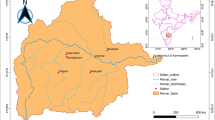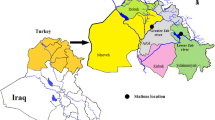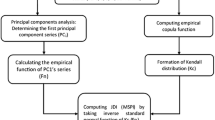Abstract
The single variable-dependent drought cannot adequately define the onset and withdrawal characteristics of the droughts. A Multivariate Standardised Drought Index (MSDI) is developed in the present study, based on precipitation and soil moisture using bivariate copula function. Reconnaissance Trivariate Drought Index (RTDI) is also developed combining precipitation, soil moisture and evapotranspiration. MSDI and RTDI represent meteorological and agricultural droughts by linking the climate status in an effective way. The best fitted copulas obtained for bivariate and trivariate analyses are Frank and Student’s t copulas respectively. The two drought indices are developed and tested to study the onset and withdrawal characteristics of drought and their trends. Cross-wavelet analysis (CWA) is performed to identify the substantial effect of large-scale climate anomalies on the derived drought indices. The large-scale climate factors like sea surface temperature (SST), Multivariate ENSO Index (MEI), Southern Oscillation Index (SOI), Indian Ocean Dipole (IOD) and Indian summer monsoon rainfall (ISMR) are considered in this study. ENSO, IOD and ISMR showed significant influences on the drought variability. The 3-month MSDI is significantly influenced by ISMR while SST showed a significant teleconnection with RTDI-3. The SST showed a strong influence on both 6-month MSDI and 6-month RTDI. This study is robust and reliable for future drought assessment and will provide a great platform to develop warning criteria on onset and termination of droughts.









Similar content being viewed by others
Data availability
All data are available in the given website.
Code availability
All codes are available from the corresponding author upon request.
References
Cherubini U, Luciano E, Vecchiato W (2004) Copula methods in finance. Wiley
Daneshkhah A, Remesan R, Chatrabgoun O, Holman IP (2016) Probabilistic modeling of flood characterizations with parametric and minimum information pair-copula model. J Hydrol 540:469–487. https://doi.org/10.1016/j.jhydrol.2016.06.044
Das J, Jha S, Goyal MK (2020a) Non-stationary and copula-based approach to assess the drought characteristics encompassing climate indices over the Himalayan states in India. J Hydrol 580:124356. https://doi.org/10.1016/j.jhydrol.2019.124356
Das J, Jha S, Goyal MK (2020b) On the relationship of climatic and monsoon teleconnections with monthly precipitation over meteorologically homogenous regions in India: wavelet & global coherence approaches. Atmos Res 238:104889. https://doi.org/10.1016/j.atmosres.2020.104889
Dixit S, Tayyaba S, Jayakumar KV (2021) Spatio-temporal variation and future risk assessment of projected drought events in the Godavari River basin using regional climate models. J Water Clim Change. https://doi.org/10.2166/wcc.2021.093
Dutta D, Kundu A, Patel NR, Saha SK, Siddiqui AR (2015) Assessment of agricultural drought in Rajasthan (India) using remote sensing derived Vegetation Condition Index (VCI) and Standardized Precipitation Index (SPI). Egypt J Remote Sens Space Sci 18(1):53–63. https://doi.org/10.1016/j.ejrs.2015.03.006
Farahmand A, AghaKouchak A (2015) A generalized framework for deriving nonparametric standardized drought indicators. Adv Water Resour 76:140–214. https://doi.org/10.1016/j.advwatres.2014.11.012
Ganguli P, Reddy MJ (2013) Probabilistic assessment of flood risks using trivariate copulas. Theor Appl Climatol 111(1–2):341–360. https://doi.org/10.1007/s00704-012-0664-4
Genest C, Favre AC, Béliveau J, Jacques C (2007) Metaelliptical copulas and their use in frequency analysis of multivariate hydrological data. Water Resour Res 43(9). https://doi.org/10.1029/2006WR005275
Genest C, Rémillard B, Beaudoin D (2009) Goodness-of-fit tests for copulas: a review and a power study. Insur Math Econ 44(2):199–213. https://doi.org/10.1016/j.insmatheco.2007.10.005
Grinsted A, Moore JC, Jevrejeva S (2004) Application of the cross wavelet transform and wavelet coherence to geophysical time series. Nonlinear Process Geophys 11(5/6):561–566. https://doi.org/10.5194/npg-11-561-2004
Guo Y, Huang S, Huang Q, Wang H, Wang L, Fang W (2019) Copulas-based bivariate socioeconomic drought dynamic risk assessment in a changing environment. J Hydrol 575:1052–1064. https://doi.org/10.1016/j.jhydrol.2019.06.010
Gupta V, Kumar JM, Singh VP (2020) Multivariate modeling of projected drought frequency and hazard over India. J Hydrol Eng 25(4):04020003. https://doi.org/10.1061/(ASCE)HE.1943-5584.0001893
Hamed KH, Rao AR (1998) A modified Mann-Kendall trend test for autocorrelated data. J Hydrol 204(1–4):182–196. https://doi.org/10.1016/s0022-1694(97)00125-x
Hao Z, AghaKouchak A (2013) A non-parametric multivariate multi-index drought monitoring framework. Sp. Issue Adv Drought Monitoring. Am Met Soc 15:89–101. https://doi.org/10.1175/jhm-d-12-0160.1
Hao Z, Hao F, Singh VP, Zhang X (2018) Quantifying the relationship between compound dry and hot events and El Niño–southern Oscillation (ENSO) at the global scale. J Hydrol 567:332–338. https://doi.org/10.1016/j.jhydrol.2018.10.022
Harris IPDJ, Jones PD, Osborn TJ, Lister DH (2014) Updated high-resolution grids of monthly climatic observations–the CRU TS3. 10 Dataset. Int J Climatol 34(3):623–642. https://doi.org/10.1002/joc.3711
Himayoun D, Roshni T (2019) Spatio-temporal variation of drought characteristics, water resource availability and the relation of drought with large scale climate indices: a case study of Jhelum basin, India. Quatern Int 525:140–150. https://doi.org/10.1016/j.quaint.2019.07.018
Huang S, Huang Q, Chang J, Zhu Y, Leng G, Xing L (2015) Drought structure based on a nonparametric multivariate standardized drought index across the Yellow River basin, China. J Hydrol 530:127–136. https://doi.org/10.1016/j.jhydrol.2015.09.042
Huang S, Huang Q, Leng G, Liu S (2016) A nonparametric multivariate standardized drought index for characterizing socioeconomic drought: a case study in the Heihe River Basin. J Hydrol 542:875–883. https://doi.org/10.1016/j.jhydrol.2016.09.059
Jha S, Das J, Goyal MK (2021) Low frequency global-scale modes and its influence on rainfall extremes over India: nonstationary and uncertainty analysis. Int J Climatol 41(3):1873–1888. https://doi.org/10.1002/joc.6935
Joshi N, Gupta D, Suryavanshi S, Adamowski J, Madramootoo CA (2016) Analysis of trends and dominant periodicities in drought variables in India: a wavelet transform based approach. Atmos Res 1822:00–220. https://doi.org/10.1016/j.atmosres.2016.07.030
Kao SC, Govindaraju RS (2010) A copula-based joint deficit index for droughts. J Hydrol 380(1–2):121–134. https://doi.org/10.1016/j.jhydrol.2009.10.029
Keyantash JA, Dracup JA (2004) An aggregate drought index: assessing drought severity based on fluctuations in the hydrologic cycle and surface water storage. Wat Resour Res 40 (9). https://doi.org/10.1029/2003WR002610
Kim G, Silvapulle MJ, Silvapulle P (2007) Comparison of semiparametric and parametric methods for estimating copulas. Comput Stat Data An 51(6):2836–2850. https://doi.org/10.1016/j.csda.2006.10.009
Krishnan R, Sabin TP, Madhura RK, Vellore RK, Mujumdar M, Sanjay J, Rajeevan M (2019) Non-monsoonal precipitation response over the Western Himalayas to climate change. Clim Dyn 52(8):4091–4109. https://doi.org/10.1007/s00382-018-4357-2
Kumar KN, Rajeevan M, Pai DS, Srivastava AK, Preethi B (2013) On the observed variability of monsoon droughts over India. Weather Clim Extremes 1:42–50. https://doi.org/10.1016/j.wace.2013.07.006
Kumar KS, Anand Raj P, Sreelatha K, Bisht DS, Sridhar V (2021a) Monthly and seasonal drought characterization using GRACE-based groundwater drought index and its link to teleconnections across south Indian river basins. Climate 9(4):56. https://doi.org/10.3390/cli9040056
Kumar KS, Rathnam EV, Sridhar V (2021b) Tracking seasonal and monthly drought with GRACE-based terrestrial water storage assessments over major river basins in South India. Sci Total Environ 763:142994. https://doi.org/10.1016/j.scitotenv.2020.142994
Kumar N, Poonia V, Gupta BB, Goyal MK (2021c) A novel framework for risk assessment and resilience of critical infrastructure towards climate change. Technol Forecast Soc Change 165:120532. https://doi.org/10.1016/j.techfore.2020.120532
Liu S, Zhang J, Wang N, Wei N (2020) Large-scale linkages of socioeconomic drought with climate variability and its evolution characteristics in Northwest China. Adv in Meteorol 2020. https://doi.org/10.1155/2020/2814539
Ma M, Ren L, Yuan F, Jiang S, Liu Y, Kong H, Gong L (2014) A new standardized Palmer drought index for hydro-meteorological use. Hydrol Process 28(23):645–5661. https://doi.org/10.1002/hyp.10063
Mckee TB, Doesken NJ, Kleist J (1993) The relationship of drought frequency and duration to time scale. In: Proceedings of the Eighth Conference on Applied Climatology. American Meteorological Society pp. 179–184
Mishra AK, Singh VP (2009) Analysis of drought severity‐area‐frequency curves using a general circulation model and scenario uncertainty. J Geophys Res-Atmos 114(D6). https://doi.org/10.1029/2008JD010986
Mishra AK, Singh VP (2010) A review of drought concepts. J Hydrol 391(1–2):202–216. https://doi.org/10.1016/j.jhydrol.2010.07.012
Mishra V, Aadhar S, Asoka A, Pai S, Kumar R (2016) On the frequency of the 2015 monsoon season drought in the Indo-Gangetic Plain. Geophys Res Lett 43(23):12–102. https://doi.org/10.1002/2016GL071407
Mishra V, Shah R, Thrasher B (2014) Soil moisture droughts under the retrospective and projected climate in India. J Hydrometeorol 15(6):2267–2292. https://doi.org/10.1175/JHM-D-13-0177.1
Nelsen RB (2006) An introduction to copulas. Springer, New York
Nguyen DD, Jayakumar KV (2018) Assessing the copula selection for bivariate frequency analysis based on the tail dependence test. J Earth Syst Sci 127(7):92. https://doi.org/10.1007/s12040-018-0994-4
Pathak AA, Dodamani BM (2020) Comparison of meteorological drought indices for different climatic regions of an Indian river basin. Asia-Pac J Atmospheric Sci 56(4):563–576. https://doi.org/10.1007/s13143-019-00162-5
Poonia V, Jha S, Goyal MK (2021) Copula based analysis of meteorological, hydrological and agricultural drought characteristics across Indian river basins. Int J Climatol. https://doi.org/10.1002/joc.7091
Rajsekhar D, Singh VP, Mishra AK (2015) Multivariate drought index: an information theory based approach for integrated drought assessment. J Hydrol 526:164–182. https://doi.org/10.1016/j.jhydrol.2014.11.031
Salvadori G, Durante F, De Michele C (2013) Multivariate return period calculation via survival functions. Water Resour Res 49(4):2308–2311. https://doi.org/10.1002/wrcr.20204
Shah D, Mishra V (2020) Drought onset and termination in India. J Geophys Res Atmos 125(15):e2020JD032871. https://doi.org/10.1029/2020JD032871
Shah D, Mishra V (2020) Integrated Drought Index (IDI) for drought monitoring and assessment in India. Wat Resour Res 56(2):e2019WR026284. https://doi.org/10.1029/2019WR026284
Shukla S, Wood AW (2008) Use of a standardized runoff index for characterizing hydrologic drought. Geophys Res Lett 35:L02405. https://doi.org/10.1029/2007GL032487
Tan X, Gan TY, Shao D (2016) Wavelet analysis of precipitation extremes over Canadian ecoregions and teleconnections to large-scale climate anomalies. J Geophys Res Atmos 121(24):14–469. https://doi.org/10.1002/2016jd025533
Tsakiris G, Pangalou D, Vangelis H (2007) Regional drought assessment based on the Reconnaissance Drought Index (RDI). Water Resour Manag 21(5):821–833. https://doi.org/10.1007/s11269-006-9105-4
Vazifehkhah S, Kahya E (2019) Hydrological and agricultural droughts assessment in a semi-arid basin: inspecting the teleconnections of climate indices on a catchment scale. Agric Water Manag 217:413–425. https://doi.org/10.1016/j.agwat.2019.02.034
Wang A, Lettenmaier DP, Sheffield J (2011) Soil moisture drought in China, 1950–2006. J Clim 24(13):3257–3271. https://doi.org/10.1175/2011JCLI3733.1
Wang H, Kumar A (2015) Assessing the impact of ENSO on drought in the US Southwest with NCEP climate model simulations. J Hydrol 526:30–41. https://doi.org/10.1016/j.jhydrol.2014.12.012
Won J, Choi J, Lee O, Kim S (2020) Copula-based Joint Drought Index using SPI and EDDI and its application to climate change. Sci Total Environ 744:140701. https://doi.org/10.1016/j.scitotenv.2020.140701
Yevjevich VM (1967) Objective approach to definitions and investigations of continental hydrologic droughts, An (Doctoral dissertation. Colorado State University, Libraries)
Zarch MAA, Sivakumar B, Sharma A (2015) Droughts in a warming climate: a global assessment of Standardized Precipitation Index (SPI) and Reconnaissance Drought Index (RDI). J Hydrol 526:183–195. https://doi.org/10.1016/j.jhydrol.2014.09.071
Zhang H, Wu C, Yeh PJF, Hu BX (2020) Global pattern of short-term concurrent hot and dry extremes and its relationship to large-scale climate indices. Int J Climatol 40(14):5906–5924. https://doi.org/10.1002/joc.6555
Author information
Authors and Affiliations
Contributions
Soumyashree Dixit — conceptualization, data curation, formal analysis, investigation, methodology, resources, software, validation, visualization and writing — original draft; K V Jayakumar — project administration, supervision and writing — review and editing.
Corresponding author
Ethics declarations
Ethics approval
None
Consent to participate
Informed consent was obtained from all individual participants included in the study.
Consent for publication
The participants have consented to the submission of the research article to the journal.
Conflict of interest
The authors declare no competing interests.
Additional information
Publisher's Note
Springer Nature remains neutral with regard to jurisdictional claims in published maps and institutional affiliations.
Rights and permissions
About this article
Cite this article
Dixit, S., Jayakumar, K.V. A study on copula-based bivariate and trivariate drought assessment in Godavari River basin and the teleconnection of drought with large-scale climate indices. Theor Appl Climatol 146, 1335–1353 (2021). https://doi.org/10.1007/s00704-021-03792-w
Received:
Accepted:
Published:
Issue Date:
DOI: https://doi.org/10.1007/s00704-021-03792-w




